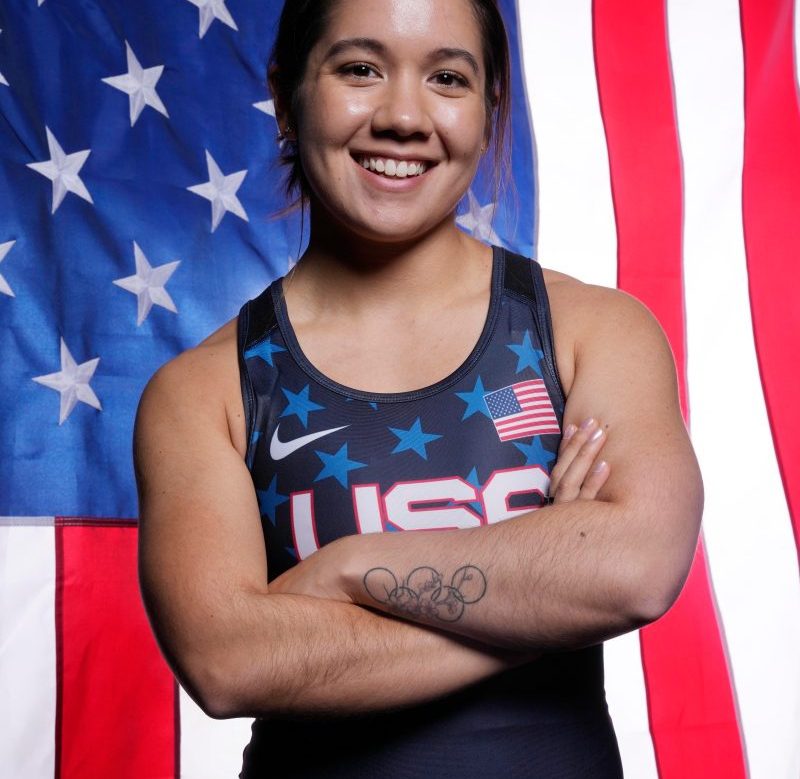Jourdan Delacruz bombed at the Tokyo Olympics.
That’s not an editorialization, mind you. In Delacruz’s sport of weightlifting, ‘bombed’ or ‘bombing out’ is a technical term, used to describe a competition in which an athlete is unable to complete a lift in the allotted number of attempts.
In 2021, it doomed Delacruz to a last-place finish in her first trip to the Summer Games.
‘At the time, it felt like a failure,’ Delacruz, now 26, told a small group of reporters at a media roundtable this spring. ‘It felt like I got to the top of this mountain and completely fell down, and would have to restart.’
In some ways, Delacruz is still processing the emotions of that moment. But in time, and with the help of her sports psychologist, she said she has come to view it not as a failure but as one competition in the broader tapestry of a largely successful career.
2024 Olympic medals: Who is leading the medal count? Follow along as we track the medals for every sport.
Since leaving Tokyo, the cheerleader-turned-weightlifter won gold at last year’s Pan American Championships, placed third at the most recent world championships and broke the American record for clean and jerk in her weight class. She is one of the five weightlifting athletes who will represent Team USA at the Paris Games.
‘I wouldn’t call it a comeback, because it’s just a part of my journey, part of my experience,’ Delacruz said. ‘(Though) obviously I want to do better this time.’
Delacruz first got into weightlifting through CrossFit, viewing it as a way to build strength and improve in her first sporting love, cheerleading. At 5 feet and 108 pounds, she doesn’t have the type of hulking physique that one would commonly associate with Olympic weightlifting. But as the daughter of two former bodybuilders, strength training came naturally to her. ‘(It’s) always been a foundation in my household,’ she said.
At the Olympic level, weightlifting is both incredibly straightforward − see weight, lift weight − and deceptively strategic, because athletes are allowed to pick the weight they try to hoist over three attempts in two types of lifts (snatch and clean and jerk). Some choose to start lighter, get on the board and add weight from there. Others go heavy from the beginning and give themselves extra chances to lift it, though they also risk scoring a zero.
In Tokyo, Delacruz opted for the latter. After successfully snatching 189 pounds, she chose a starting weight of roughly 238 pounds for the clean and jerk − which she had successfully lifted in competition just months earlier, and would have put her in bronze medal position. But after three attempts, she was unable to complete the lift.
Delacruz described the immediate aftermath of that moment as ‘isolating,’ in part because she shared a coach with two other Team USA athletes, who had performed well. She said she flew home alone, left to process her feelings − and all of the social media chatter and news articles about her performance − by herself.
‘If you look up my name, it was ‘Jourdan fails at Olympics.’ And that was really hard,’ she said. ‘Because I knew I wasn’t a failure. I knew that my journey wasn’t a failure. I knew that I had so much to do. But that’s what I thought people saw. Obviously my close support system doesn’t see that, but I would say just kind of sorting through the media was really challenging.’
As her Olympic return neared, Delacruz acknowledged that some of the memories and negative feelings of Tokyo have started to creep back in. But she has come to understand that it’s all just part of the process.
‘I think at this level, we’re constantly put in positions of doubt,’ Delacruz said. ‘We’re trying to improve our total by one kilo. We’re trying to get just one percent stronger. So I think we’ve become accustomed to doubt. We’ve become − I wouldn’t say friends with it, but we’re used to it.’
Contact Tom Schad at tschad@usatoday.com or on social media @Tom_Schad.

